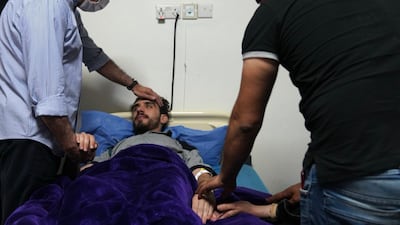Iraqi Prime Minister Mustafa Al Kadhimi visited Ali Al Mikdam in hospital after the prominent political activist was rescued from kidnappers on Sunday.
Mr Al Mikdam was freed by security forces, the prime minister's office said in a statement. Mr Al Mikdam, who had reportedly received threats over his activism, was seen in a cafe in the Iraqi capital’s Karrada district on Friday afternoon before his disappearance, local media had reported.
The abduction follows a pattern of assassinations and disappearances of activists and critics of the government and powerful Iran-backed groups in the Popular Mobilisation Forces, an umbrella grouping of state-sanctioned militias.
Mr Al Mikdam, also a journalist and a researcher, was a vocal critic of the Iraqi authorities during a mass protest movement that began in October 2019 to demand political reforms, an end to rampant corruption, better state services and more jobs.
More than 500 people were killed and thousands injured during a violent suppression of the months-long protests.
Mr Al Mikdam had moved to Istanbul and then to Erbil in Iraq’s semi-autonomous Kurdistan region, following the threats. He had returned to Baghdad eight days earlier, his mother told AFP on Friday, after his abduction.
“Only two days ago he told me he had received threats and gave me the phone numbers of his friends to contact if anything bad happens to him,” she said, holding back her tears.
Jeanine Hennis, the UN's Special Envoy to Iraq, also visited Mr Al Mikdam in hospital.
"We salute his courage and determination, and condemn cowardly aggressions that threaten a pillar of democracy: freedom of expression," Ms Hennis said on Twitter.
Human rights groups in Iraq have placed on the government the responsibility to provide protection for citizens, to find those kidnapped and to hold perpetrators to account.
"The release of Ali Mikdam shows how the government is capable of finding those who were abducted but there is little willingness to do so," Ali Al Bayati, a member of the semi-official Iraqi High Commission for Human Rights, told The National.
"This is a national security issue that must be combatted," Mr Al Bayati said, adding the public has the right to voice their concerns and fight for their rights in a secure environment.
After taking office in May last year, Mr Al Kadhimi promised to investigate the killings and abductions and bring those responsible to justice, but with little success so far.
A commander in the PMF, Qassem Musleh, was arrested in May over the killing of the activist Ihab Al Wazni in Karbala earlier in the month, sparking a stand-off between the militias and state security forces. The courts ordered his release weeks later, citing a lack of evidence.


